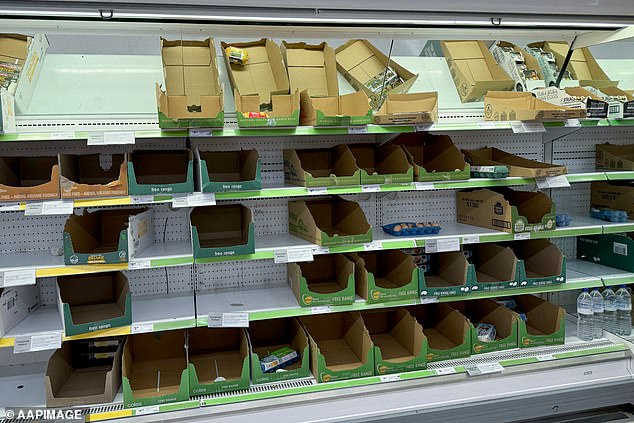A strain of bird flu that caused egg shortages and emptied supermarket shelves is no longer affecting Australia, but consumers are still being warned that supply will remain low.
Hundreds of thousands of chickens have been killed in Australia’s quest to rid itself of the disease after Victoria, New South Wales and the ACT experienced outbreaks.
However, each instance has been carefully eradicated, and with no new detections since July, the federal government announced on Thursday that Australia was officially free from H7 avian influenza.
‘This is something every Australian should be proud of,’ Agriculture Minister Julie Collins said.
‘It demonstrates that governments and industry are really switched on to the risks and will act quickly to respond to emergency animal disease outbreaks.’
The egg shortage has led to Coles and Woolworths introducing purchase limits on the staple food item.
Despite the flu being eradicated, a search on the websites of both major supermarkets on Thursday showed cartons of eggs were almost entirely unavailable in stores on the east coast.
One recent post on Reddit about empty shelves was met with dozens of commenters saying they had struggled to find eggs for weeks, save for a few sporadic occasions where some cartons appeared.

A strain of bird flu that led to egg shortages and emptied supermarket shelves (pictured) no longer plagues Australia

Minister Julie Collins (pictured) said Australians can not be complacent about the risk of new bird flu strains
Egg Farmers Australia, the leading organisation representing the industry, confirmed that the egg shortage could last or months, even though the bird flu is no longer present in the country.
‘The disease required laying flocks on infected farms to be destroyed. The good news is that the majority of farms impacted have now restocked with new layer hens and egg production on these properties is expected to gradually return to normal over the next six months,’ CEO Melinda Hashimoto explained.
On top of this there is a major upheaval happening in the egg industry as farms shift away from caged production.
‘The industry is facing a transitional period as some farms transition to barn laid or free-range production systems,’ Ms Hashimoto continued.
‘This is in anticipation of a phase out of conventional caged eggs in many states as a result of changes to Australia’s Animal Welfare Standards and Guidelines for Poultry. It takes time and capital expenditure to establish new farming infrastructure.
‘Major supermarkets have put up signs apologising to customers for fewer eggs on their shelves. This is because Woolworths and Coles have a policy to mostly stock barn laid or free-range eggs.’
Ms Hashimoto believes egg production should gradually return to normal during the first half of 2025.
Aldi is also experiencing the shortage but doesn’t have buying limits, while IGA supermarkets are independently owned so will differ between locations.


The recent shortage has been caused by a perfect storm of avian flu outbreak, seasonal demand and a shift to cage free production
Over the past 50 years, Australia has successfully contained and eradicated H7 bird flu a number of times, but this does not mean the country can let its guard down.
The highly pathogenic H5N1 strain of bird flu has devastated animal populations overseas, and while it is not yet present in Australia, the disease is proliferating due to the migration patterns of wild birds.
‘The rapid spread abroad of a highly contagious and serious H5 bird flu strain, which has killed not only birds but also mammal species across the globe, means we cannot be complacent,’ Ms Collins said.
The federal government has invested more than $100million to bolster national preparedness and responses to this strain of bird flu.
Avian influenza, commonly known as ‘bird flu’, is a highly contagious virus that can cause sudden death in poultry.
The World Health Organisation says the deadly H5N1 strain rarely affects humans and is not easily transferred between people, though Australians have been urged to avoid contact with sick or dead wildlife.








